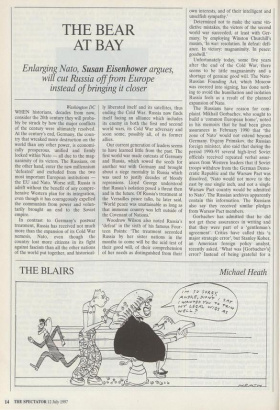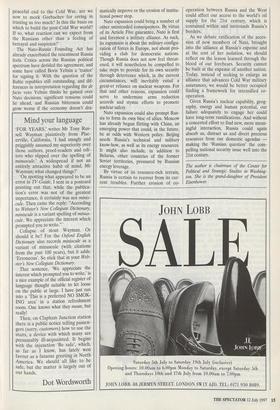THE BEAR AT BAY
will cut Russia off from Europe instead of bringing it closer
Washington DC WHEN historians, decades from now, consider the 20th century they will proba- bly be struck by how the major conflicts of the century were ultimately resolved. At the century's end, Germany, the coun- try that wreaked more destruction on the world than any other power, is economi- cally prosperous, unified and firmly locked within 'Nato — all due to the mag- nanimity of its victors. The Russians, on the other hand, enter the new millennium `defeated' and excluded from the two most important European institutions the EU and Nato. Worse still, Russia is adrift without the benefit of any compre- hensive Western plan for its integration, even though it has courageously expelled the communists from power and volun- tarily brought an end to the Soviet empire.
In contrast to Germany's postwar treatment, Russia has received not much more than the expansion of its Cold War nemesis, Nato, even though the country lost more citizens in its fight against fascism than all the other nations of the world put together, and historical- ly liberated itself and its satellites, thus ending the Cold War. Russia now finds itself facing an alliance which includes its enemy in both the first and second world wars, its Cold War adversary and soon some, possibly all, of its former allies.
Our current generation of leaders seems to have learned little from the past. The first world war made outcasts of Germany and Russia, which sowed the seeds for another war with Germany and brought about a siege mentality in Russia which was used to justify decades of bloody repressions. Lloyd George understood that Russia's isolation posed a threat then and in the future. Of Russia's treatment at the Versailles peace talks, he later said, `World peace was unattainable as long as that immense country was left outside of the Covenant of Nations.'
Woodrow Wilson also noted Russia's `defeat' in the sixth of his famous Four- teen Points: 'The treatment accorded Russia by her sister nations in the months to come will be the acid test of their good will, of their comprehension of her needs as distinguished from their own interests, and of their intelligent and unselfish sympathy.'
Determined not to make the same vin- dictive mistakes, the victors of the second world war succeeded, at least with Ger- many, by employing Winston Churchill's maxim, 'In war: resolution. In defeat: defi- ance. In victory: magnanimity. In peace: goodwill.'
Unfortunately today, some five years after the end of the Cold War, there seems to be little magnanimity and a shortage of genuine good will. The Nato- Russian Founding Act, which Moscow was coerced into signing, has done noth- ing to avoid the humiliation and isolation Russia feels as a result of the planned expansion of Nato.
The Russians have reason for com- plaint. Mikhail Gorbachev, who sought to build a 'common European home', noted in his memoirs that he had been given assurances in February 1990 that 'the zone of Nato' would not extend beyond Germany. Evgeny Primakov, the Russian foreign minister, also said that during the period 1990-91 several high-level Soviet officials received repeated verbal assur- ances from Western leaders that if Soviet troops withdrew from the German Demo- cratic Republic and the Warsaw Pact was dissolved, 'Nato would not move to the east by one single inch, and not a single Warsaw Pact country would be admitted to Nato'. The Russian archives apparently contain this information. The Russians also say they received similar pledges from Warsaw Pact members.
Gorbachev has admitted that he did not get these assurances in writing and that they were part of a 'gentleman's agreement'. Critics have called this 'a major strategic error', but Stanley Kober, an American foreign policy analyst, recently asked, 'What was [Gorbachev's] error? Instead of being grateful for a peaceful end to the Cold War, are we now to mock Gorbachev for erring in trusting us too much? Is this the basis on which to build the post-Cold War world? If so, what reaction can we expect from the Russians other than a feeling of betrayal and suspicion?'
The Nato-Russia Founding Act has already exacerbated the resentment Russia feels. Critics across the Russian political spectrum have derided the agreement, and some have called Boris Yeltsin a 'traitor' for signing it. With the question of the Baltic republics still outstanding, and dif- ferences in interpretation regarding the de facto veto Yeltsin thinks he gained over Nato decisions, significant tensions could lie ahead, and Russian bitterness could grow worse if the economy doesn't dra- matically improve or the erosion of institu- tional power stop.
Nato expansion could bring a number of other unintended consequences. By virtue of its Article Five guarantee, Nato is first and foremost a military alliance. As such, its expansion is about the military configu- ration of forces in Europe, not about pro- viding a club for democratic nations. Though Russia does not now feel threat- ened, it will nonetheless be compelled to take steps to provide for its own security through deterrence which, in the current circumstances, will inevitably entail a great-er reliance on nuclear weapons. For that and other reasons, expansion could serve to undermine arms reduction accords and stymie efforts to promote nuclear safety.
Nato expansion could also prompt Rus- sia to form its own bloc of allies. Moscow has already begun flirting with China, an emerging power that could, in the future, be at odds with Western policy. Beijing needs Russia's technical and military know-how, as well as its energy resources. It might also include, in addition to Belarus, other countries of the former Soviet territories, pressured by Russian energy leverage. By virtue of its resource-rich terrain, Russia is certain to recover from its cur- rent troubles. Further erosion of co- operation between Russia and the West could affect our access to the world's oil supply for the 21st century, which is contained within and surrounds Russia's borders.
As we debate ratification of the acces- sion of new members of Nato, brought into the alliance at Russia's expense and at the cost of her isolation, we should reflect on the lesson learned through the blood of our forebears. Security cannot be built at the expense of another nation. Today, instead of seeking to enlarge an alliance that advances Cold War military assurances, we would be better occupied finding a framework for intensified co- operation.
Given Russia's nuclear capability, geog- raphy, energy and human potential, our failure adequately to engage her could have long-term ramifications. And without a concerted effort to find new, more mean- ingful interaction, Russia could again absorb us, distract us and divert precious resources from our domestic agendas making the 'Russian question' the com- pelling national security issue well into the 21st century.
The author is chairman of the Center for Political and Strategic Studies in Washing- ton. She is the grand-daughter of President Eisenhower.



























































 Previous page
Previous page